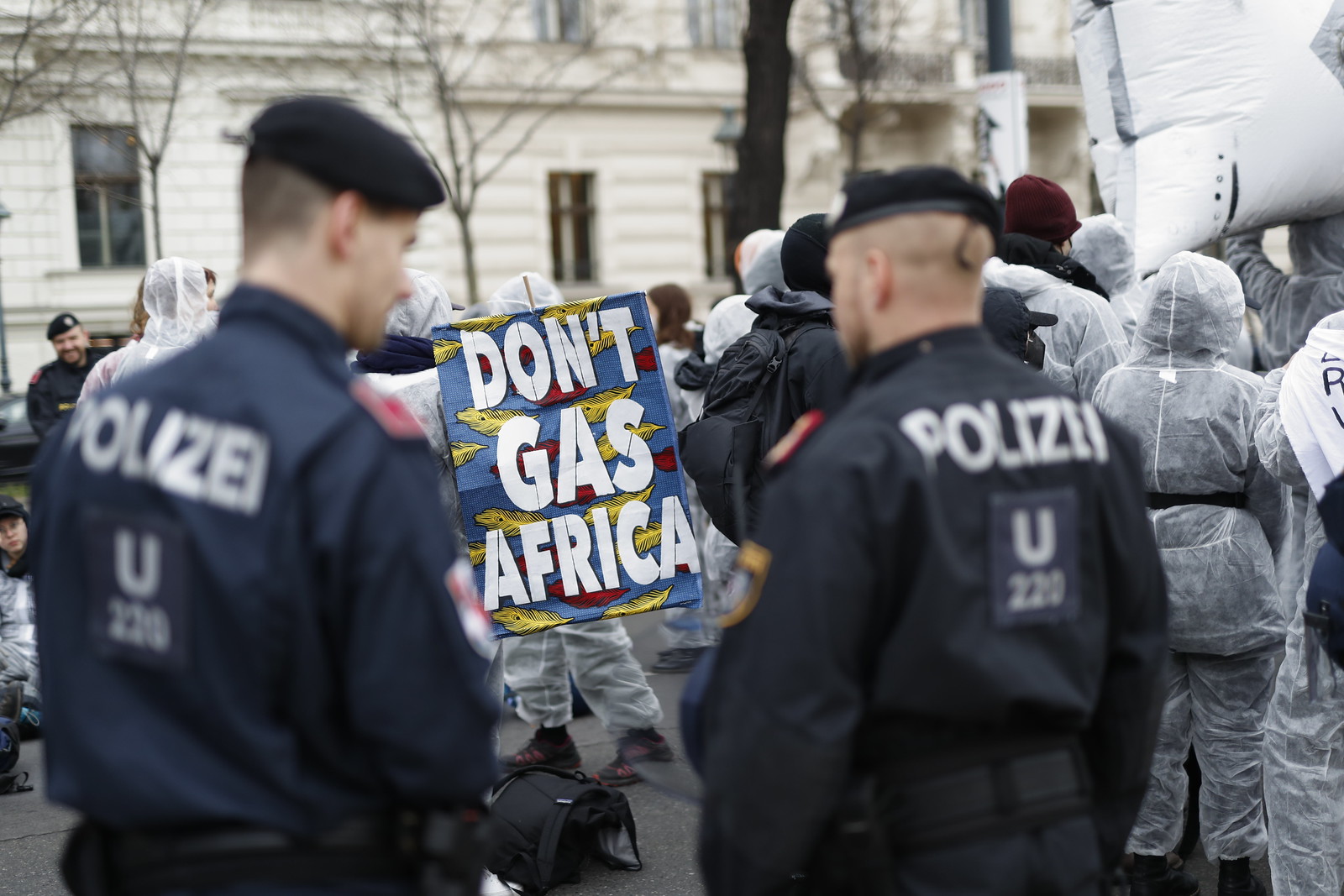By Dean Bhekumuzi Bhebhe, Don’t Gas Africa and Naomi Kreitman, Gastivists Collective
The fossil-fuel-induced energy apartheid in Africa has left 600 million Africans without access to modern clean renewable energy. To ensure Africa is not locked-in fossil gas production, movements across Africa are demanding an end to fossil gas and other dirty, dangerous, obsolete and inappropriate energy systems.
.
Since Ukraine’s invasion, gas supply from Russia has been drastically reduced, leading to exorbitantly rising energy prices and obscene enrichment of big oil and gas companies, leaving millions impoverished. In typical shock doctrine style, fossil fuel companies take advantage of crises to build out even more fossil fuels, wasting an opportunity to radically fund renewable and energy efficient solutions.
Hundreds of activists from around Africa and Europe gathered in Vienna calling out a gas industry conference, The European Gas Conference, effectively gate-crashing champagne-networking. Organised by the Block Gas Alliance, concerned and committed activists blockaded the conference, while participating in an alternative open Power to the People Summit, geared towards building real solutions to multiple unfolding global crises.
In a flustered dash to replace Russian gas at any cost, European companies and politicians have rushed to plunder gas from Africa, the Americas, and the East Mediterranean. Climate targets, health risks, community displacement and loss of livelihood are ignored in the pursuit of new fossil, so-called “natural”, gas.
The push for gas from Europe to Africa since the invasion of Ukraine includes Italian politicians and fossil fuel giant ENI, promoting deals to import more gas from Angola and Congo; BP’s LNG expansion in Senegal and Mauritiana; Germany’s politicians seeking gas from Senegal; while the EU plans a fivefold increase in financial military support in Mozambique, protecting gas interests, not people. Their allies include Total (France), ENI (Italy) and BP (UK).
Meanwhile, analysts estimate fossil fuel consumption in Europe could plummet by 20% in 2023, double the previous record from 2020. This genuinely makes the gas investment flurry all the more puzzling.
Instead of more gas extraction projects, we need radical investments in renewables and energy efficiency solutions. Europe needs a renaissance of autogenous ideas and leadership deeply rooted in long-term sustainability governed through robust initiatives such as the proposed Fossil Fuel Non-Proliferation Treaty already endorsed by the EU Parliament, or the Beyond Oil & Gas Alliance (BOGA), led by Denmark, amongst others. 2022 was a record year for renewable energy generation in the EU27 – this is the trend we need and want to see.
An equitable distribution of energy across different sectors of society must be prioritised, domestically, regionally and globally. Real energy security will only be achieved when considered and treated as a basic human right, not a commodity for the fortunate (and wealthy).
Fossil fuels are inextricably linked to war and militarisation; from the Gulf war, to the tensions between Greece and Turkey, as well as civil wars in Africa, to mention but a few. More gas will never bring peace and stability to communities, but rather prolongs the addiction to imported combustible fuel.
What is needed? A radical overhaul in our approach: distribute, and produce energy as a society, prioritising peoples’ energy needs over fossil fuel corporations’ shareholder profits, both in Europe and in Africa. Planned fossil fuel projects were already incompatible with limiting global warming to 1.5 degrees pre-Ukraine invasion, said the International Energy Agency (IEA). Any new extractive plans fly in the face of the Paris Climate Agreement or the target to keep global heating beneath 1.5 degrees, highlighted the IPCC’s latest synthesis report.
The European dash for gas in Africa has similarities to what is historically referred to as the Scramble for Africa. Continuing to allow the rest of the world to make decisions for Africa’s energy future means the continent will forever be trapped in a poisonous cycle of indebtedness and dependency. The dash for gas is a political issue for Africa: the current energy infrastructure does not foster local ownership. The European Gas Conference only risks perpetuating Africa’s resources and sovereignty being subject to foreign ownership and influence, fostering neocolonial gas projects converting the continent into Europe’s gas pump. The ongoing climate and ecological emergency demands Africa urgently shifts away from dependence on fossil fuel based energy generation.
The Dash for Gas will fail to deliver on development in Africa. Make no mistake – its true intent was never to help the continent ‘develop’. Tapping Africa’s fossil oil and gas reserves risks creating a climate bomb inconsistent with the planet’s current needs. The effects will be felt the world over: what happens in Africa won’t stay in Africa.
Social movements are uniting to fight trade routes across continents; a just transition is inevitable and necessary; gas industry events such as the European Gas Conference are no longer going unnoticed. Our house is on fire, and citizens from across the world refuse to watch it burn with their arms crossed.
The EU has agreed to push for a global fossil fuel phase-out ahead of COP28. Great. Yet, Brussels and EU Member States need to show Europeans and the world how serious they are. To be credible, the Union must develop a roadmap with a clear date for its own gas phase-out. The European Commission has the opportunity and the obligation to propose a 2040 climate target in the first half of next year. Announcing an ambitious target with a strong deadline for a gas phase out at the State of the European Union, von der Leyen would send a signal to Africa and the world.
The message is clear. Don’t Gas Africa.





